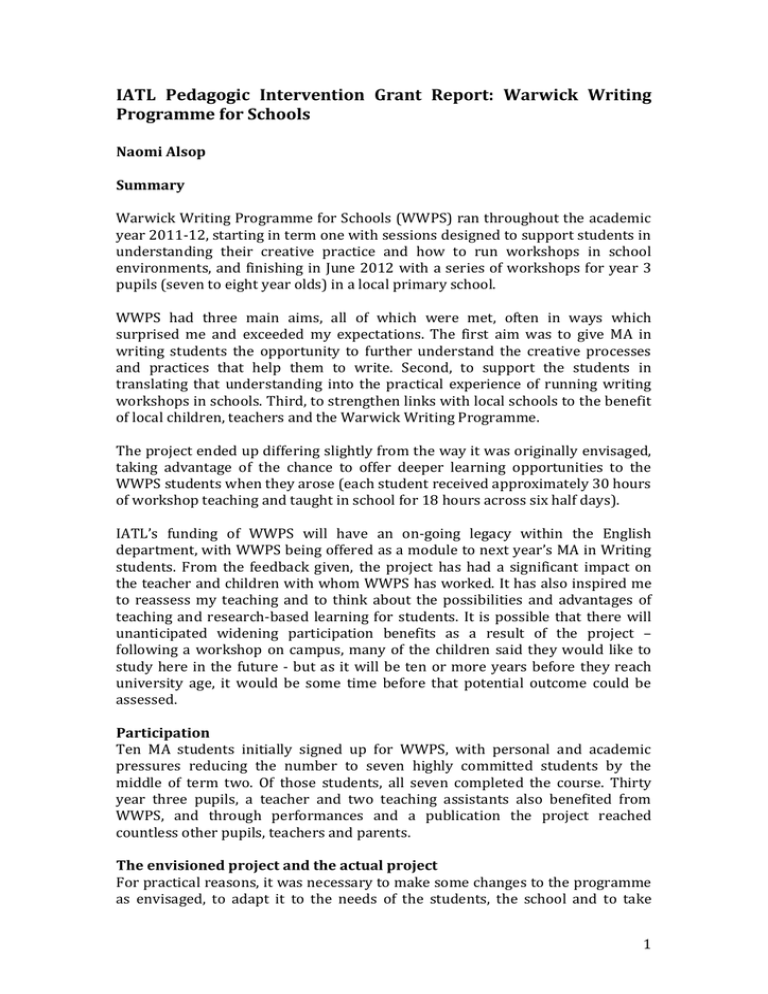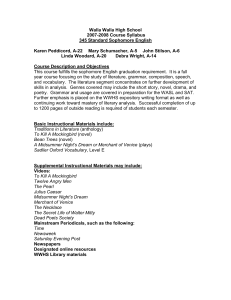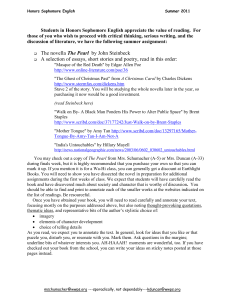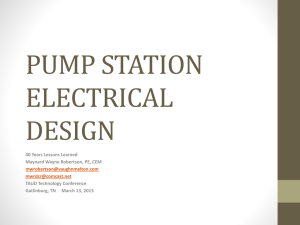IATL Pedagogic Intervention Grant Report: ... Programme for Schools
advertisement

IATL Pedagogic Intervention Grant Report: Warwick Writing Programme for Schools Naomi Alsop Summary Warwick Writing Programme for Schools (WWPS) ran throughout the academic year 2011-12, starting in term one with sessions designed to support students in understanding their creative practice and how to run workshops in school environments, and finishing in June 2012 with a series of workshops for year 3 pupils (seven to eight year olds) in a local primary school. WWPS had three main aims, all of which were met, often in ways which surprised me and exceeded my expectations. The first aim was to give MA in writing students the opportunity to further understand the creative processes and practices that help them to write. Second, to support the students in translating that understanding into the practical experience of running writing workshops in schools. Third, to strengthen links with local schools to the benefit of local children, teachers and the Warwick Writing Programme. The project ended up differing slightly from the way it was originally envisaged, taking advantage of the chance to offer deeper learning opportunities to the WWPS students when they arose (each student received approximately 30 hours of workshop teaching and taught in school for 18 hours across six half days). IATL’s funding of WWPS will have an on-going legacy within the English department, with WWPS being offered as a module to next year’s MA in Writing students. From the feedback given, the project has had a significant impact on the teacher and children with whom WWPS has worked. It has also inspired me to reassess my teaching and to think about the possibilities and advantages of teaching and research-based learning for students. It is possible that there will unanticipated widening participation benefits as a result of the project – following a workshop on campus, many of the children said they would like to study here in the future - but as it will be ten or more years before they reach university age, it would be some time before that potential outcome could be assessed. Participation Ten MA students initially signed up for WWPS, with personal and academic pressures reducing the number to seven highly committed students by the middle of term two. Of those students, all seven completed the course. Thirty year three pupils, a teacher and two teaching assistants also benefited from WWPS, and through performances and a publication the project reached countless other pupils, teachers and parents. The envisioned project and the actual project For practical reasons, it was necessary to make some changes to the programme as envisaged, to adapt it to the needs of the students, the school and to take 1 advantage of the opportunities that presented themselves. We were unable to work with some of the local schools with which we’ve worked in the past due to the possibility of immanent unannounced OFSTED inspections. Instead, I established new links with one local primary school, St John’s in Allesley, where the WWPS students were able to work with the same pupils over the course of a term. Through my work as a writer in schools I know this is often the most rewarding and useful way of working with pupils, both for the pupil and the writer. Planning and delivering six half-day workshops took a great deal of the WWPS students’ time and for that reason some planned aspects of WWPS had to be dropped. For example, the sessions by Warwick tutors could not be incorporated into the teaching timetable. This was a pity, as it would have been useful for the students to talk to their tutors about the influences on their teaching. However, the effect of the omission was mitigated by discussions we had in the WWPS workshops about how to learn from being a student in writing workshops and by observing the teaching methods of tutors. Warwick Volunteers WWPS was able to work with Warwick Volunteers, who gave students practical support and reimbursed students for travel to and from the school, where necessary. Warwick Volunteers also funded a coach to bring the 30 pupils on to campus. This was regarded by pupils as a highlight of the sessions, and meant they were able to work in the Writers’ Room, the Rehearsal Space and the Reinvention Centre. Judging by the letters the children wrote after the end of the sessions, it also had the unexpected effect of showing Warwick University to the children as somewhere they might want to study later on, and several of the year 3 children wrote that they wanted to attend the university when they were older. Working with Writing West Midlands and the National Association of Writers in Education The half-day course run by WWM and NAWE was cited as a highlight by many of the WWPS students. It gave students the opportunity to gain other perspectives on working as a writer in schools, and to meet other writers who were looking to go into the field. One student commented after the project that for her one of the highlights of WWPS had been ‘The exposure to other writers earning their living in schools, prisons etc. This workshop was energising and provided practical ideas to follow up’ (Liz Baker, WWPS student and writer). IATL’s Objectives The initial Expression of Interest for the IATL Pedagogic Intervention Grant stated that WWPS would meet four of IATL’s objectives. These were academic literacy, open space learning, research-led learning and local community engagement. Academic literacy The past year has confirmed my theory that often one of the best ways to understand something is to work out how you would communicate it to a seven 2 year old. The evaluation completed by the WWPS students at the end of the year was very positive. Participating in WWPS was held to have benefited their own writing and improved their understanding of their own creative processes. The students commented on many occasions that when they were answering the questions the seven year olds put to them, they found they were solving some of the problems they were facing in their own writing. The clarity required when communicating with the year 3 pupils appeared to help the students unpick problems as well as to better understand the ways they approached their writing. For example, one of the students wrote after WWPS had come to an end that In terms of writing I’ve come to realise that all the reasons why they children felt they couldn’t write are also applicable to us, as creative writers. Their barriers – lack of self-trust, lack of belief in their own imaginations, fear that their writing might not be appreciated – are also our barriers when it comes to sitting down and putting pen to paper. To me, at least, it’s been a great revelation, and by reflecting on that I’ve come to realise that most of my ‘writer’s blocks’ are, in fact, sourced in the same fears that have no basis in reality and need to be overcome. Maria-Silvia Cohut, WWPS student and writer. Another wrote Working with kids has made me realise the power of imagination. To think that seven and eight year olds could tell such amazing stories and some of us writers still struggle with ideas. It made me remember I was once a child with equally powerful ideas… and now I feel like I need to unlock some of that mad, liberating creative potential. I also felt more confident about the children’s novel I’d been working on since Easter. Apeksha Harsh, WWPS student and writer. Open space learning The WWPS sessions for the students were mainly held in the Writers’ Room, as well as the Rehearsal Room, the CAPITAL and Humanities studios and the Reinvention Centre. Workshops for the students were run, from the start, in the form of interactive workshops as might be delivered in a school environment. Students took an active part in running the workshops, devising icebreakers and leading parts of sessions. The open space added immeasurably to the dynamic and interactive nature of the workshops. I do not think the workshops would have been as successful, if they were possible at all, in a traditional classroom setting. Research-led learning WWPS included an element of traditional library-based research, which the students conducted into the school environment and the creative practices of other writers. However, the most exciting research occurred in the classroom when students were learning from each other. A notable feature of the WWPS sessions was the support given by the students to each other. They shared ideas, discussed activities and ways of thinking, helping them in their writing and in 3 planning and delivering their workshops. This contributed strongly to the success of WWPS this year. Local community engagement Whilst the intention was originally that WWPS would work with a number of schools, we developed an excellent relationship with St John’s Church of England Primary School. The teacher with whom we worked, Ruth O’Shea, was generous with her time and advice, and was entirely supportive of the project. The success of the project is due in large part to her support of the students and her willingness to allow the students to try out their ideas. In summing up her experience Ruth commented on the advances the children’s writing had made while they worked with the WWPS students, and also on the benefit to her as a teacher: Working with WWPS has been the highlight of the year […] The writers showed huge commitment and enthusiasm throughout the project. They were eager to learn from both staff and children. Their creativity and enthusiasm inspired the children who always looked forward to them coming. […] Professionally it has been a highly valuable experience. It has enabled me to both share my experiences with other adults and to learn so much from the writers in inspiring children to write. […] Each student was able to inspire the children’s imagination and creativity, enabling the children to grow in confidence and enjoyment in writing. Ruth O’Shea, Year 3 Class Teacher, St John’s School, Allesley. Following the final session at the school, the children wrote letters to the writers they had worked with. The following extracts are taken from the letters and are indicative of the ways the children felt they had benefited from working with the ‘big writers’. A recurring theme was the fear felt by the children about writing before the project, and the new confidence and fun they now had with writing. I had the fun of a lifetime not just at the university but every week you came. I loved the part when we walked around in a circle and pretended to be animals. Thank you for helping me to write more. Now I am more confident because I used to be scared to put my ideas down but now I’m not. I first thought writing was scary but then I found out it was quite fun. I like writing a lot more than I used to. Now I think it’s really fun and it made me more confident that I used to. And you made me more confident and better. Before you came I did not want to read my work out but now I believe in myself and in my work and I feel confident in myself and I believe I can do it. Thank you for onomatopoeia. 4 Thank you for helping me write and making me better and also trying to work and have fun at the same time. I am going to keep on writing even though you’re not working with me anymore. I am going to write at home about all the things we were doing over the past few Thursdays. I have grown as a writer because I have got more ideas into my head. Thank you for all the fun we had with you. At first I didn’t like writing but now I LOVE IT. Conclusion: the legacy of the WWPS WWPS has been one of the most enjoyable projects that have worked on. I have learned more than I could have imagined from the students, from the pupils and from Ruth O’Shea. IATL’s support of WWPS has been invaluable, particularly the advice given by Dr Catherine Hanley on reshaping the project to take advantage of emerging opportunities. Next year, as a direct result of this opportunity to develop WWPS, WWPS will be offered as a module to MA in Writing students on the Warwick Writing Programme. The module will draw on many of the lessons of this year’s WWPS project, including the importance of open-space, active, research and experiencebased learning. I have learned a great deal over the last year about the value of giving students the opportunity to research, examine and experiment with those aspects which help them and others to be creative and to learn. Moreover, the substantial benefits that the student-as-teacher can bring to the student, the university and the wider community have become clearer to me. Following a conversation with Dr. Nick Monk, I am looking into ways that these insights could be incorporated into new teaching and learning opportunities in different centres across the university. The importance of play to learning has also been an interesting and unexpected finding of this year’s WWPS project and I am investigating ways of finding out more about the relationship between adult pedagogy and play. Watching the students supporting each other in developing ideas and practice has been a pleasure. The students have been determined to engage and inspire the pupils they worked with and have worked hard to make the workshops fun and playful for the children. They’ve learned from each other, they’ve played, read, practiced, experimented and critiqued, and they’ve discovered things about their own writing from the children with whom they’ve worked. And I have learned more about my pedagogical and writing practices by working with them. 5


